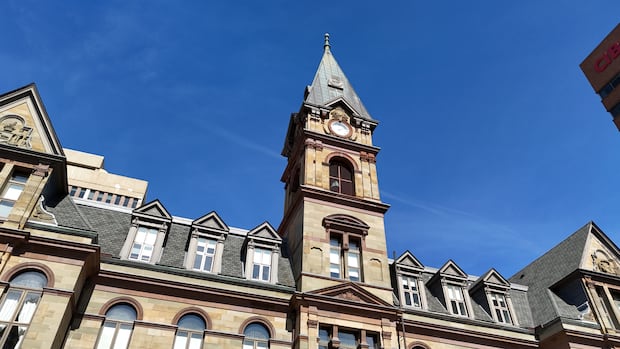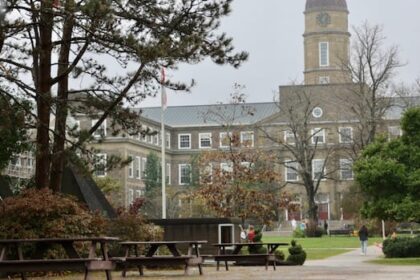Nova ScotiaHalifax council will consider cutting services and grants and increasing user fees in an effort to reduce a tax bill increase for next year’s budget. Budget discussions to last months, final decision comes in April 2026Haley Ryan · CBC News · Posted: Nov 19, 2025 6:40 PM EST | Last Updated: 3 hours agoListen to this articleEstimated 4 minutesThe audio version of this article is generated by text-to-speech, a technology based on artificial intelligence.Halifax councillors have directed staff to search for service reductions and other options for possible cuts to the upcoming budget. (Brian MacKay/CBC)Halifax council will consider cutting services and grants and increasing user fees in an effort to reduce a tax bill increase for next year’s budget.On Wednesday, the city’s budget committee made up of councillors and the mayor met to kick off discussions for the 2026-27 budget.Financial staff said as of now, the average residential property tax bill would rise 10.5 per cent to cover an about $88.9-million increase over the 2025-26 budget. That works out to roughly an extra $276 a year on the average residential property tax bill, staff said.That increase comes even with holding spending to this year’s levels, and is driven by what staff call “unavoidable increases” like inflation, contractual obligations and mandatory provincial contributions.Mayor Andy Fillmore said 10.5 per cent is still “simply too high” and council must make changes to bring that down.Halifax Mayor Andy Fillmore speaks with media at city hall on July 8, 2025. (CBC)“We need to explore every possible way to reduce the burden on taxpayers,” Fillmore said during the meeting.“As our residents are tightening their belts, so too must we.”He said changes now could be beneficial in future years, which are forecasted to see annual tax bill raises ranging from eight to 12 per cent each year as the city’s debt climbs and pressures from other major projects continue. Council passed Fillmore’s motion asking staff to come back with a slew of options over the coming months of budget debate to reduce the tax bill increase.They include having all departments propose service reductions, increases to user fees and fines, a hiring freeze, reducing contribution agreements for groups like the Halifax Partnership or museums, reducing the climate action fund by one-third, and a 10 per cent cut to program grants.Council also passed Coun. Trish Purdy’s request to have staff suggest possible cuts in capital spending or projects that were approved in previous years that have yet to begin.Budget should only have ‘affordability lens’: councillorCoun. Billy Gillis of Lower Sackville-Beaver Bank said he hears from residents every day asking him to find ways to keep property taxes from rising. He read an email from a veteran who said the proposed tax hike has him wondering whether he must sell his home, as it comes on top of rising utility bills and health-care expenses for his family.“I think we need to look at this with an affordability lens, and nothing else more,” Gillis said.Fillmore said it is important that Halifax follow the lead of other governments. The federal government is looking to find 15 per cent savings over three years, while the province recently asked officials to look at the impacts of a 10 per cent cut to discretionary spending and program grants.Financial staff said Halifax is left relying heavily on property taxes to handle paying for the major infrastructure and service increases that have come with a population spike in recent years. Other cities could raise their municipal permit and development fees to have developers pay for some of that growth, but Halifax rates have been frozen by the provincial government since 2023.Coun. Sam Austin of Dartmouth Centre was one of a few councillors who voted unsuccessfully against even considering reducing the fund that drives Halifax’s climate change projects. He said “short-changing our future” does not make sense, especially in light of recent extreme weather events like this summer’s drought where many residents’ wells ran dry.But Austin said Fillmore’s approach makes sense because it puts the onus on elected officials to steer the budget.“No secret at this point: the mayor and I have very different philosophical [views] on what we should be doing here in the city, but actually I think this is the prudent way to go,” Austin said.“Give us the options, and then we decide.”Council will make a final decision on the budget in April.Residents saw the average residential bill rise about 4.7 per cent in 2025-26. The tax rate itself was kept flat, at 0.770 per $100 of assessment.MORE TOP STORIES ABOUT THE AUTHORHaley Ryan is the municipal affairs reporter for CBC covering mainland Nova Scotia. Got a story idea? Send an email to haley.ryan@cbc.ca, or reach out on Twitter @hkryan17.
Halifax to consider service cuts, fee increases to bring down 10.5% property tax hike











